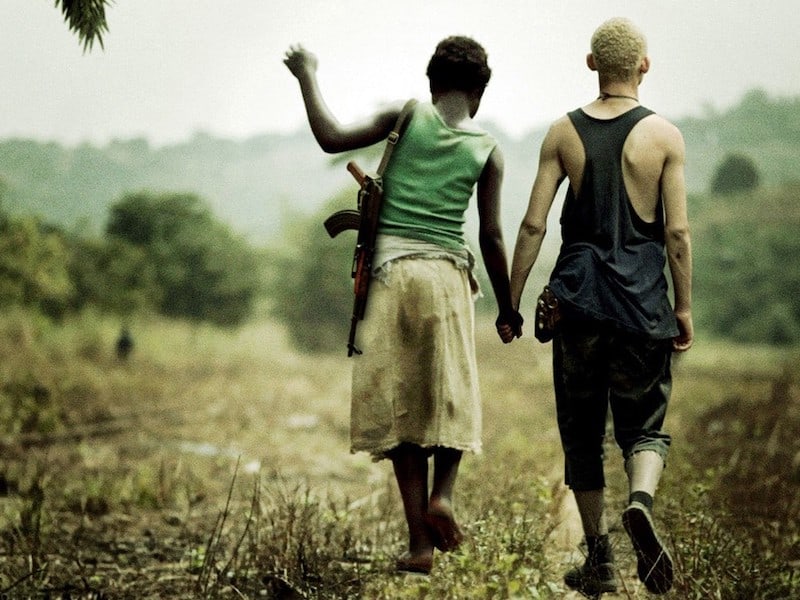
Best Foreign Language Film nominee War Witch (aka Rebelle) is the story of a young girl kidnapped by a rebel army in the Democratic Republic of the Congo and forced into becoming a child soldier. Yet, despite the moral simplicity we often expect from the Oscars, it is not a film designed to make you weep and rally around a cause. I would argue that that film doesn’t exist, hasn’t existed, but that’s a conversation for another day. War Witch is not the long form cinematic equivalent of “Kony 2012” either. It is, rather, a beautifully wrought tale of humanity that is much more focused on its own characters than it is on your tears.
If anything, Kim Nguyen’s Oscar-nominated feature has more in common with an adventure novel than any human rights campaign video. War Witch is three years in the life of a young girl, whose journey through central African life would be picaresque if it weren’t so earnest and genuine. The film opens on Komona (Rachel Mwanza) at twelve years old, living in a small village with her parents. She narrates her own story, with a lucidity reminiscent of 18th century autobiographical fiction.
The biggest trauma comes almost immediately, as her world is destroyed by the makeshift army of the Grand Tiger. She is held at gunpoint by the rebels, handed a Kalashnikov, and forced to execute her parents. The ensuing 90 minutes, episodic and widely scoped as they might be, are in essence her recovery (and ours) from this single, horrifying incident.
Komona is quickly integrated into the Grand Tiger’s army, made up primarily of children presumably captured in similar ways. She is taught that her gun is her new mother and father, part of a conditioning process that begins almost instantly. The kids are immersed in the basics of armed combat as well as the mythology around their leader, a man as ruthless as he is distant. They watch Jean Claude Van Damme movies for motivation, pick fights and shoot their weapons into the air and live in a constant, adolescent chaos.
They soon go out on a raid, Komona’s first. Addled by a psychotropic juice that the children drink to be combat-ready, she sees the spirits of the dead in the forest, figures painted pale who warn her of the coming government soldiers. As she continues to be aided by these ghosts, she becomes known as a witch. This privileged position offers her a new standing in the Grand Tiger’s army, but also opens her up to the dangers of jealousy and infamy.
From here, the narrative continues to wander about. She becomes close friends with the group’s magician (Serge Kanyinda), an albino teenager a couple years her senior. They escape, and spend the middle portion of the film living an almost soothing juvenile freedom away from the violence of the Grand Tiger. It is in these scenes that War Witch most artfully engages with its bold, magical symbolism. They fall in love. There is a hunt for a rare white rooster, a visit to a small albino community, and the persistence of the ashen ghosts. These bleached images, culminating in a makeshift hearse in the final scenes of the film, haunt Komona like the phantoms of her parents.
The quiet audacity of the images, when coupled with the meandering nature of the story, give War Witch an air of literary depth that well exceeds its otherwise modest dimensions. It is full of open-ended details that turn prosaic. The magician’s uncle is a butcher, who keeps a bucket at his side while he works because the physicality of his occupation reminds him of “what happened to his family” and makes him nauseous, a back story from which we are shielded by Komona’s narration. Nguyen’s script builds out from its heroine and immerses us in a world of emblematic touchstones, rich with an almost mythological social commentary and an unflinching devotion to both the brutal and the idyllic mundane of life in war-torn central Africa.
War Witch is hardly the first Canadian submission to the Best Foreign Film category at the Academy Awards to be set far, far away from the Frozen North. Incendies and Water, nominees in 2011 and 2007, were set in Lebanon and India respectively. 2012’s most important Canadian movies (which will be recognized at the Canadian Screen Awards next week) include not only War Witch but also the Ramallah-set Inch’Allah and Deepa Mehta’s adaptation of Salman Rushdie’s Midnight’s Children. One could even include Life of Pi, with both shooting and post-production locations in Canada (and of course based on a Canadian novel and scored by newly Oscar-winning composer Mychael Danna).
War Witch is one of the best examples of this new globalization of cinema as a whole, and in Canada particularly. This is a movement that we often miss here in the US, where the consumption of American films in international market gets more attention than international production. If the films continue to be this fantastic, however, one can only hope that this conversation begins to move out of the Best Foreign Language Film category at the Oscars and into our larger conversation around cinema.
The Upside: Rachel Mwanza’s performance is extraordinary and shows great depth for such a young actress.
The Downside: I’m undecided on Kim Nguyen’s choice to use chapter headings, which might give a little too much order to the narrative.
On the Side: There’s still no word on whether Mwanza was able to meet Beyoncé at the Oscars.
